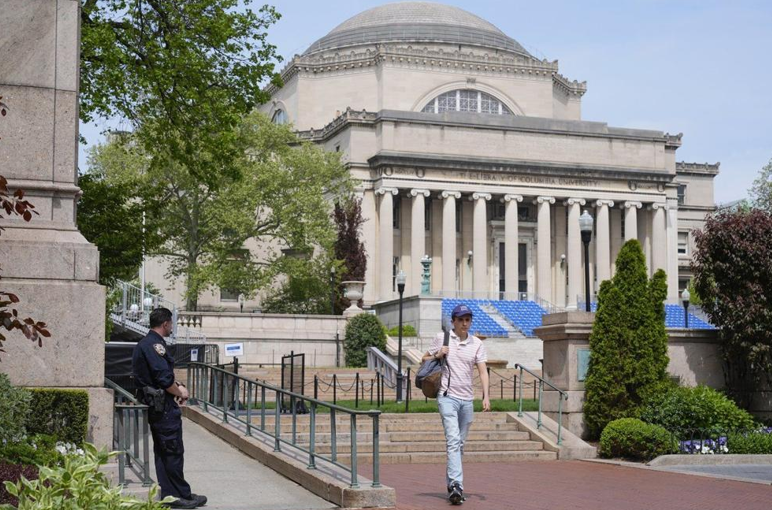
A New York City police officer keeps watch on the campus of Columbia University in New York, Monday, May 6, 2024. (AP Photo)
Chaos erupted at Columbia University on Wednesday evening as a pro-Palestinian protest spiraled into a dramatic standoff. Masked demonstrators stormed the prestigious Butler Library, clashing with campus security before NYPD officers moved in to clear the scene.
Protesters Storm Historic Library
Dozens of demonstrators pushed past campus security and rushed into the library’s ornate reading room. Once inside, they hung Palestinian flags and banners across bookshelves and defaced artwork with slogans like “Columbia will burn.” Videos circulating online captured the intensity, showing crowds of protesters shouting and security guards trying to block further entry.
Campus officials said the protest disrupted students preparing for final exams. Columbia’s acting president, Claire Shipman, called the protest “outrageous” and confirmed that two campus safety officers were injured during the scuffle.
NYPD Intervenes as Tensions Escalate
As the situation intensified, university officials called in the NYPD. Officers in riot gear flooded the campus, entered the library, and began removing protesters. Social media videos showed more than 30 individuals being escorted out with their hands tied behind their backs.
Outside, supporters rallied around police barriers, chanting “Free Palestine” in solidarity with those detained. The university said demonstrators were repeatedly asked to leave and provide ID, but refused to comply.
City and State Leaders Respond
New York City Mayor Eric Adams defended the police response, stating that officers were removing trespassers. Governor Kathy Hochul echoed the sentiment, emphasizing that while peaceful protest is a right, violence and property damage are not acceptable.
On social media, political figures added fuel to the fire. U.S. Senator Marco Rubio slammed the protesters, calling them “Pro-Hamas thugs” and suggested a visa review for foreign participants. His statement followed earlier efforts under the Trump administration to crack down on international students involved in anti-Israel protests.
Crackdown on Campus Demonstrations
Columbia University has already taken steps to tighten protest policies. In March, the school introduced new rules following federal pressure, including a ban on face coverings and a requirement for protesters to show ID. The administration also boosted campus security and empowered officers to make arrests.
The pro-Palestinian student group Columbia University Apartheid Divest claimed responsibility for occupying the library. They accused the university of profiting from “imperialist violence” and warned that repression would only lead to further disruption.
Federal Charges Heighten the Stakes
Wednesday’s protest coincided with a separate federal announcement. The Justice Department revealed hate-crime charges against 20-year-old Tarek Bazrouk, a man linked to several violent incidents at pro-Palestinian rallies near Columbia.
Bazrouk is accused of assaulting Jewish individuals, including kicking someone near the New York Stock Exchange and punching others at Manhattan protests. His attorney insists he will vigorously fight the charges. Though a magistrate judge allowed bail, prosecutors are challenging the decision. A hearing is set for Tuesday.
Campus on Edge
The dramatic events at Columbia highlight the deepening divide on campuses nationwide over the Israel-Palestine conflict. With heightened security, stricter protest rules, and federal scrutiny, the university is now a flashpoint in the national debate over free speech, activism, and public safety.
As exam season continues, Columbia remains tense, with students, staff, and officials grappling with the fallout of a protest that made headlines far beyond the campus gates.















